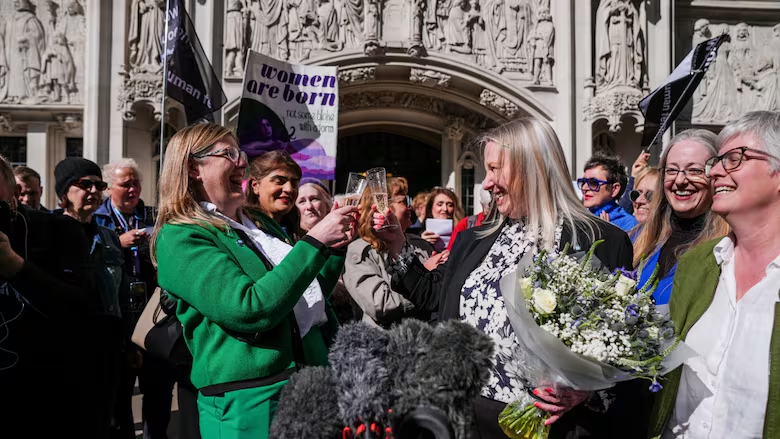LONDON — In a landmark legal decision, the United Kingdom’s Supreme Court ruled on Wednesday that the legal definition of “woman” under the Equality Act 2010 refers exclusively to biological sex, not gender identity. The ruling has major implications for how single-sex spaces and services operate across the country, sparking both praise and concern from various communities and legal experts.

The unanimous judgment concluded that trans women, even those with a Gender Recognition Certificate (GRC) that legally affirms their gender identity, do not meet the definition of “woman” in the context of sex-based protections outlined in the Equality Act.
“The unanimous decision of this court is that the terms ‘woman’ and ‘sex’ in the Equality Act 2010 refer to a biological woman and biological sex,” said Deputy President of the Supreme Court, Lord Patrick Hodge, delivering the verdict. “But we counsel against reading this judgment as a triumph for one or more groups in our society at the expense of another — it is not.”
The case was brought forward by the campaign group For Women Scotland (FWS) in response to guidance issued by the Scottish government as part of a 2018 law intended to improve female representation on public sector boards. That guidance stated that trans women with a GRC should be counted as women.
FWS, supported by several lesbian rights organizations, challenged the guidance, arguing that it misrepresented the legal definition of sex and compromised the integrity of female-only spaces. Although they initially lost the case in Scottish courts, the Supreme Court ruled in their favor, stating that the Scottish guidance unlawfully redefined “woman” beyond the scope intended by the Equality Act.
“Today the judges have said what we always believed to be the case: that women are protected by their biological sex, that sex is real, and that women can now feel safe that services and spaces designated for women are for women,” said Susan Smith, co-director of FWS, addressing a group of cheering supporters outside the court.
The ruling provides a definitive legal foundation for organizations offering single-sex services—such as women’s refuges, hospital wards, changing rooms, and sports clubs—to lawfully exclude trans women without violating anti-discrimination laws.
The UK government welcomed the decision, calling it a “clarifying moment” for institutions grappling with the complexities of gender identity in policy-making.
“Single-sex spaces are protected in law and will always be protected by this government,” a spokesperson said.
One organization directly affected is NHS Fife, a Scottish health authority currently involved in a lawsuit brought by a nurse who was suspended for objecting to a trans woman using a women-only changing facility. NHS Fife acknowledged the ruling and stated, “We will now take time to carefully consider the judgment and its implications.”
Reactions to the ruling have been sharply divided. Celebrated author J.K. Rowling, known for her critical views on gender identity legislation, praised the decision on social media:
“It took three extraordinary, tenacious Scottish women with an army behind them to get this case heard by the Supreme Court and, in winning, they’ve protected the rights of women and girls across the UK,” she posted on X (formerly Twitter).
On the other hand, LGBTQ+ rights advocates and trans campaigners expressed serious concerns over the potential for discrimination and marginalization.
“Today is a challenging day, and we are deeply concerned at the widespread, harmful implications of today’s Supreme Court ruling,” read a joint statement from several LGBTQ+ organizations, including Stonewall.
They emphasized that while the ruling narrows the interpretation of ‘woman’ under the Equality Act, the law still offers trans people protection against discrimination and harassment.
Trans rights activist and campaigner Ellie Gomersall condemned the ruling as “another attack on the rights of trans people to live our lives in peace.”
Legal experts warned that the ruling could necessitate urgent updates to Britain’s equality laws to address the growing complexities surrounding gender identity and legal recognition.
“This ruling underscores the need for Parliament to revisit and potentially reform equality legislation to ensure that it offers coherent and comprehensive protections,” said Phillip Pepper, employment partner at the law firm Shakespeare Martineau.
While Pepper acknowledged that the ruling brings long-awaited clarity for businesses and institutions previously navigating conflicting legal interpretations, he also cautioned that it could deepen social divides in the short term. “This could create further division and increase tensions,” he said, “but it will offer long-term clarity for businesses that have been left in legal limbo.”
The UK ruling comes amid a wider global debate over transgender rights. In the United States, legal battles continue over executive orders issued during Donald Trump’s presidency, including bans on transgender individuals serving in the military. Advocates worldwide argue that conservative movements have weaponized identity politics, while critics on the other side claim that expanding trans rights can undermine protections for biological women.
As Britain navigates this contentious issue, the Supreme Court’s judgment has firmly reasserted biological sex as the legal basis for defining ‘woman’ under existing equality law, ensuring lasting consequences for policy, activism, and the daily lives of both cisgender and transgender individuals in the UK.


